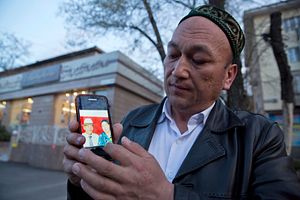Ethnic Kazakhs have served as a critical window for the world into the political re-education camps, into which Human Rights Watch claimed in a recent report an estimated 1 million people have been sent by Chinese authorities in Xinjiang. At the same time, Kazakhstan — like much of the international community — has hesitated to take a public stand against Chinese policies.
In a September 10 report, Human Rights Watch chronicled the drastic escalation of security measures in Xinjiang since late 2016, including “mass arbitrary detention, torture, and mistreatment of Turkic Muslims in Xinjiang.”
The human rights organization’s report adds to a damning, and expanding, catalog of evidence that through both new technologies and old, Cultural Revolution tactics, Beijing is exerting unprecedented pressure on Xinjiang’s population.
In August, a Uyghur activist living in exile in the Netherlands told the Wall Street Journal, “I believe the Chinese government’s goal is to completely erase the [Uyghur] ethnic identity.”
While Uyghurs appear to make up the majority of those affected by Chinese policies in Xinjiang, it’s ethnic Kazakhs who are opening the window to tell the world what’s happening there.
The recent Human Rights Watch report is built on interviews with 58 people affected by what the Chinese term the “Strike Hard Campaign against Violent Terrorism” in Xinjiang. Five of those interviewed are former detainees and 38 are relatives of detainees. “Interviews with ethnic Kazakhs who left Xinjiang for Kazakhstan heavily inform the content” of the report, according to Human Rights Watch. In ethnic terms, 32 of the 58 interviewees were ethnic Kazakhs followed by 23 ethnic Uyghurs, and one each ethnic Hur, Uzbek and Kyrgyz.
In August, a court in eastern Kazakhstan declined to deport an ethnic Kazakh Chinese citizen who had illegally crossed the border, fleeing from a position working as a teacher in one of the re-education camps. Sayragul Sauytbay had told the same court in July that she’d been reassigned from the kindergarten in Xinjiang where she worked to “what is called in China a political camp.”
“In fact, it is a prison located in the mountains,” Sauytbay said. Her testimony, which was widely covered and closely watched, provided a first-hand account of the camps.
As I wrote earlier this year, the case “put Kazakhstan in a bind, caught between international political and economic concerns — China is one of Kazakhstan’s largest trading partners — and domestic pressure.” Sauytbay’s release avoided a possible flashpoint, given rising anti-Chinese sentiment in Kazakhstan and the country’s unease with public protests.
The concerns Kazakhstan has to juggle are myriad, but it’s clear the problem in neighboring Xinjiang won’t just go away.
Human Rights Watch sent a letter to the Minister of Foreign Affairs of Kazakhstan Kairat Abdurakhmanov with a series of questions regarding the government’s interaction with its Chinese counterparts specifically with regard to its Xinjiang policies and its response to the detention of ethnic Kazakhs.
Unlike the Chinese, which didn’t respond to Human Rights Watch’s letter, the Kazakhs did reply. The response, while underwhelming, is illustrative of Astana’s position on the Xinjiang problem.
Rather than responding to the questions directly, the reply from Kazakhstan — attributed to Azamat Ayap, a counselor to the Minister of Foreign Affairs — goes on at length about the strength of Kazakh-Chinese relations, “based on the principles of mutual respect, equality, a high level of trust, mutual understanding, and good-neighborliness.”
The letter stresses that the “large Kazakh diaspora” in China is “constantly showing its loyalty to the Central Government of the PRC.” The Chinese authorities, in turn, “treat the Kazakhs as one of the indigenous peoples and pursue an appropriate policy to support ethnic minorities.” The letter cites Kazakh publishing houses, radio programs, and mayors as evidence.
And then the letter closes with a reference to Article 55 of the Vienna Convention on Consular Relations, 1963, which states that interference in internal affairs of another State is not permitted. Appeals that Kazakhstan receives from ethnic Kazakhs in Xinjiang are handled diplomatically with the Chinese and anyway, “[a]ccording to the data from the Chinese party, in most cases, there are violations of Chinese law.”
In short: What happens in Xinjiang is not really our business.
Individual ethnic Kazakhs may be courageously opening the window for the world to get a sense of what is happening in Xinjiang, but don’t look to Kazakhstan to lead an international charge to respond to the situation. At present, Astana’s political and economic calculations preclude pushing back against China in any meaningful way.
“The political obstacles to holding China accountable for its violations do not relieve the United Nations and governments of their responsibilities to uphold human rights protections,” Human Rights Watch notes in its report.

































